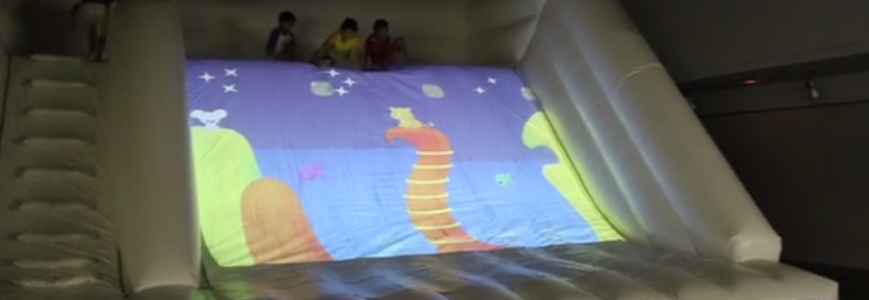Archimedes
Archimedes: Full-Body Interaction & Learning
Archimedes: Full-Body Interaction & Learning
Archimedes is a Full-Body Interaction Learning Environment designed to support children’s hands-on learning on the notion of buoyancy and Archimedes principle.
A strand of our research has been dedicated to the design, development and evaluation of Full-Body Interaction Learning Environments, understood as learning experiences where users use their bodies to interact with digital technologies and construct meaning.
An initial example of them is the Archimedes project. Archimedes is a Full-Body Interaction Learning Environment based on the Interactive Slide platform, a large inflatable slide augmented with digital technology. Archimedes was originally designed and developed in 2012. Its goal was to support children’s hands-on learning on the notion of buoyancy and Archimedes principle. In its preliminary evaluation we showed that playing with this experience on the Interactive Slide was more effective to support learning gains than playing with the same experience on a desktiop computer.
Subsequently, in 2015, we carried out an in-depth evaluation of the project with 48 children from a local school (mean age: 11). The study was oriented toward exploring how children create bridges between embodied experiences and meaning construction while interacting with a Full-Body Interaction Learning Environment.

Related Publications:
Marie-Monique Schaper, Ole Sejer Iversen, Laura Malinverni, Narcis Pares. (2019). FUBImethod: Strategies to engage Children in the co-design of Full-Body interactive experiences. International Journal of Human-Computer Studies., 132: 52-69. DOI= http://doi.org/10.1016/j.ijhcs.2019.07.008
Laura Malinverni, Edith Ackermann, and Narcis Pares. (2016). Experience as an Object to Think with: from Sensing-in-action to Making-Sense of action in Full-Body Interaction Learning Environments. In Proceedings of the TEI '16: Tenth International Conference on Tangible, Embedded, and Embodied Interaction (TEI '16). ACM, New York, NY, USA, 332-339. DOI: https://doi.org/10.1145/2839462.2839477
